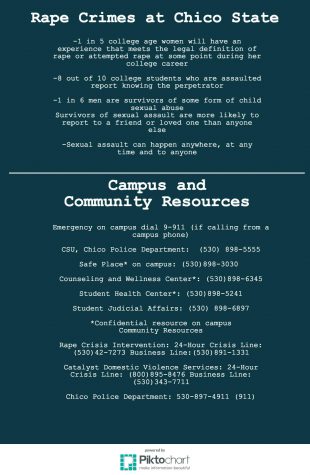A rape report filed on Super Bowl Sunday at a campus fraternity raised questions about how a sexual assault report is handled by local officials and health professionals.
University Police will respond to any report of sexual assault if it takes place on campus. They will then ensure that the student seeks medical attention even if they are not critically injured.
This is crucial to the investigation of the sexual assault because evidence generally must be collected within 72 hours of the assault, and only by a certified medical facility upon the request of a law enforcement agency. To preserve evidence after an attack, the victim should not change their clothes, bathe, shower, or take any other personal hygiene action before contacting police.
This evidence is taken in the form of an exam involving a rape kit and standard protocol to treat rape victims.

According to Jaqueline-Winters Hall, a sexual assault nurse at Enloe Medical Center, this exam includes body swabs taken from the victim to provide samples for DNA testing. This exam is done by a trained medical professional and the victim may decline or ask the test to be stopped at any time.
Chico State Health Center does not administer the rape kit because they do not have medical professionals who are trained in this field. They will provide psychological support determining where the victim is in terms of coping with the sexual assault.
“It depends on where the victim is in dealing with the trauma of the incident,” Jill Cannaday, nursing supervisor said. “Every scenario of rape is different so they must be treated depending on the situation and the person.”
The Chico State Counseling and Wellness Center provides crisis assessment and intervention for people experiencing immediate concerns. During evenings, weekends, holidays and vacation breaks when the Counseling Center is not open, the Butte County Crisis Line is available 24 hours a day.
According to the Chico State Counseling Center, students who have been sexually assaulted suffer a significant degree of physical and emotional trauma during a rape, immediately after a rape, and over a considerable time period after a rape.
There are different phases a victim will go through after the incident. At first, the student may express a variety of emotions including, shock, disbelief, helplessness, shame, anger, depression. Others may appear to be very controlled with their emotions, seeming almost numb.
During the second phase, outward adjustment, the student may appear as if they are adjusting to being raped and dealing with it; however, they may be trying to forget about the rape to the best of their ability.
Sometimes victims are reluctant to comply with details of the sexual assault.
“This is a result of their power being taken away,” Cinda Trembess said, an outreach professional at the Chico Crisis Rape & Prevention Center. “They have just lived through this trauma and are now being forced to revisit the experience by explaining what has happened.”
Nicole Henson can be reached at [email protected] or @theorion_news on Twitter.








